#Character Writing
Text
I was initially uncertain of Fallout's Lucy, because naïve and optimistic protagonists can be tricky to write well, often falling into one of two traps:
1. They're written to be infallibly trusting/positive and always morally correct, making them feel one-note, delusional, or grating in their perfect morality.
2. They're cynically punished for their attempts at kindness and optimism, basically being told to "grow up" by making their acts of positivity, trust, or kindness backfire horribly.
Lucy meanwhile hits the perfect balance. She's kind but not incapable of cruelty, naive but not stupid, and pushes back when the world (represented by The Ghoul,) tries to force its cynicism upon her.
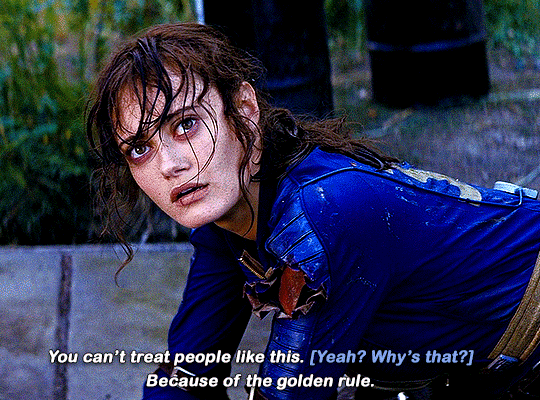
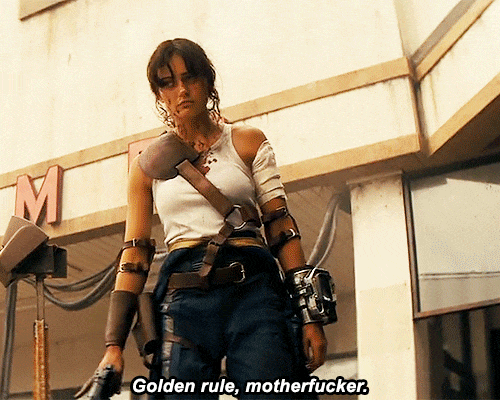
#fallout tv series#fallout prime#fallout show#fallout spoilers#fallout#fallout lucy#lucy maclean#the ghoul#cooper howard#fallout series#fallout season 1#character writing#optimism
51 notes
·
View notes
Text
This may mean nothing to you but there is this show from my childhood that I love called “Agent Carter” that had a villain character on it and she was raised from childhood to be an assassin and spy and one of the things that I remember especially about her is that she was chained to her bed to keep her from escaping and even when she was a grown woman she still had to cuff herself to her bed because she couldn’t sleep without doing it
And anyways Donatello Von Draxum was raised sleeping in cages and chained to his bed so now I’m thinking—
#just thinking#until i found you#until i found you au#rottmnt until i found you#rottmnt donnie#agent carter#peggy carter#marvel#tv#character writing#writing ideas#writing angst#writing trauma#rottmnt#rise of the teenage mutant ninja turtles
51 notes
·
View notes
Text
Honestly? My main piece of advice for writing well-rounded characters is to make them a little bit lame. No real living person is 100% cool and suave 100% of the time. Everyone's a little awkward sometimes, or gets too excited about something goofy, or has a silly fear, or laughs about stupid things. Being a bit of a loser is an incurable part of the human condition. Utilize that in your writing.
#this is my beef with a lot of 'badass' characters and male romantic leads tbh#writeblr#writing#character writing#writing advice#characters#i'm just sayin'
42K notes
·
View notes
Text
It's always risky killing off a character but if you have to, you must have them HAUNT the narrative. Let their death and absence be constantly felt at some level.
#writing advice#creative writing#writing process#writing#writers#writers on tumblr#writeblr#character death#narrative#character writing
4K notes
·
View notes
Text
Random Character Profiles
Prodigal slacker. An exceptional intellect, capable of solving complex problems with ease, but absolutely no drive or motivation to apply their abilities towards any practical endeavors. Others are often frustrated by the wasted talent, but they couldn't care less. If their ideas are so great, someone else can come up with them. They're just here to laze around and have fun.
Loveable annoyance. A mind that dances on the border of sanity, and a perpetual source of simultaneous amusement and irritation. They delight in making puns and bad jokes at the expense of others' patience. Undeniably loveable nonetheless.
Reluctant recluse. They present a facade of rugged independence, portraying themselves as one who thrives on solitude and despises the company of others. They project an air of indifference towards others, often dismissing any attempts at connection or sympathy with a sharp retort or a cold shoulder. But beneath this tough exterior lies a soft spot reserved for the select few who have managed to breach their defenses—though they're reluctant to show it, going to great lengths to conceal the affection they view as weakness. Their stubborn refusal to accept help or acknowledge their own struggles stems from a fiercely guarded sense of pride, manifested in their vehement denial of any signs of weakness or vulnerability, even when they're visibly on the brink of death.
Sister figure. Sharp-witted and quick-tongued; will shame, embarrass, and ruthlessly tease. Their sarcasm is as much a display of fondness as it is merciless. Fiercely affectionate, extremely caring, unwaveringly loyal. Will put themself in danger for those they love, and will not hesitate to hurt anyone who offends or hurts those they care for; but mess up, and their sternness could make a warrior sob.
Impressively patient. Reserved, caring, mature, typically polite and tolerant to an extreme extent. May lash out occasionally. Possessive of a quiet strength, tending to observe situations with a thoughtful demeanor. Their reserved nature can be mistaken for aloofness despite their deep well of empathy and care for those around them. They navigate social interactions with a polite grace; however, beneath this composed exterior lies a potential for volatility on the rare occasions when they are pushed to their limit. Often the peacekeeper in friend groups.
People hater. Seems perpetually done with everything and everyone. Specialises in dry remarks and diminishing enthusiasm. General mood killer. However, their outward projection of disdain and superiority is really a mask of their own feelings of inadequacy.
Feel free to add on any other character descriptions you like! Happy writing ❤
#writeblr#writing#writing tips#writing help#writing resources#creative writing#character description#character development#character traits#character design#writing characters#character writing
508 notes
·
View notes
Text
How to Write an IMPACTFUL Backstory
Honestly, writing and reading about backstories is probably one of my favorite parts of a character's story! It's a strong foundation for a character's goals, motives, thoughts, and actions! Its most powerful effect, on the other hand, is its ability to change one's view on a character. So, then, how do we write such an impactful past?
For beginners, the more tragic the backstory, the better. While this does hold some truth, let me re-iterate that it's for beginners. The idea behind it is that a pure, devastatingly pitiful backstory is unique and pulls at your reader's heartstrings. Unfortunately, instead, we're left with an origin story that feels superficial, overly-dramatic, unnecessary, and shallow. However in this post, I will give you some tips on how to avoid creating such 2D backgrounds and actually bring your character's past to life!
First, your character's backstory can be made with whatever components you choose, but the key is that you must balance them out correctly. Additionally, the majority of the time, you do want their story to stick out, so I suggest trying to come up with something original! It's much harder than it sounds, but honestly, every other protagonist has dead parents at this point. Be creative, add details, and don't be afraid to let your character go through things if you feel that it's fitting!
Second, don't extend their past for too long. The point of introducing the backstory is to elaborate on a (few) certain event(s) that affected your character the most and forever changed their lives. Keep it centered around one, or at most, a couple events.
Next, most writers tend to use sadness and/or to fuel the character, but it should not be overbearing and excessive. Alternatively, it should feel GENUINE. Not dramatic, but genuine. Different genres do form different types of backstories, yes, but the core concept behind it should be something natural. It should be something that your readers will be able to understand; something authentic. They should feel some sense of relatability, even if it's just a little. This could be like family issues, broken friendships, betrayals, leaving someone, mental struggles, loneliness, etc. Complexity can surround these concepts, but the basic, fundamental ideas should still be present.
Furthermore, be sure that their backstory makes sense. Even if you're introducing it through quick, brief flashbacks, ultimately, you want the reader to have all the pieces to solve the puzzle.
Last but not least, make your backstory feel personal to your character! Build it in a sense that if it were to go to any other character, it wouldn't have an effect that's as severe. Make it targeted to its owner. While this is something that can be difficult to execute, it really provides insight to your character, and is an easy way to add some intricacy to a simple backstory! A good place to start is thinking about the things personal to your character. For instance, this could be their past before the event, people they care about, their morals, etc. Then, add it in said event so that it pushes and/or challenges your character in a way that makes them re-evaluate that value.
There you go! Here are my personal tips on how to upgrade your character's backstory and have it really impact your reader! Be creative, keep it centered around a couple things, make it genuine, and make it targeted to the character!
Happy writing~
3hks <3
#writing#writeblr#writerscommunity#writing tips#writing inspo#creative writing#writing advice#thank you#how to write a backstory#tips to writing a backstory#backstory#character creation#oc writing#character writing#writing a backstory
1K notes
·
View notes
Text


(discord messages via @snowflake-owl)
5K notes
·
View notes
Text
So I’ve been thinking about rational vs. irrational character decisions.
An irrational decision is great when your story is driven by your character’s personal flaws and struggles, and for crafting situations where your audience knows that these decisions are unavoidable because they are perfectly in character. Having your characters be perfectly able to solve their problems if they weren’t, y’know, themselves, is so very hard-hitting, and can be a fantastic part of a narrative.
The downfall with irrational decisions is that it can make situations seem less dire or make your antagonists seem less dangerous. If your characters are falling over themselves and their own personal issues, then it’s hard to show how the external problems in your story pose a serious threat, because you can’t demonstrate how they’re hard to deal with if your characters aren’t making solidly competent attempts in the first place.
Rational decisions are great for stories where most of your problems are external, like your characters trying to build a spaceship or infiltrate the bad guy’s lair. It’s also key to any horror writing, where you need your characters to be competent in order for your danger to be credible; if your audience spends the entire time wondering why your protagonists aren’t doing very obvious things to solve their problems, it’ll be a lot harder to get a properly spooky atmosphere going. But if your characters are only ever making the most optimal, logical choices without ever struggling, they won’t be very compelling, so just like with irrational decision-making, there’s a time and a place for this.
Ideally, you want some combination of both rational and irrational character choices. And maybe even more importantly, whatever choice a character’s making needs to be one that makes sense for them given everything you’ve already shown in the narrative so far. If the decision feels forced or contrived, then it doesn’t matter if it’s rational or not, because it’s not a choice that fits with the rest of the story.
But, yeah, ultimately, both types of character decisions are useful tools, and it’s less about one or the other being right, and more about both of these tools being useful for different types of situations.
#ink posts#character writing#writeblr#creative writing#writing#writing inked#writing tips#writing advice#storytelling#writerscommunity#writers on tumblr
727 notes
·
View notes
Note
What should you do if you feel that two of the characters are too similar and want to distinguish their personalities?
Characterization: Unforgettable Characters
I would say that's the whole point of characterization! Often we write about characters with similar ages, ethnicities, place of residence, etc.
It's all about: "How memorable is this particular character?"
Unusual Physical Features
Give your characters one distinguishable physical feature that can be referenced throughout.
Maybe one of them come from a family of redheads. It can be as simple as making one of them wear glasses.
The way we look, and the reactions we get from other people about our looks, form a large part of our own self-perception. This is especially true if your characters are teens, or have a job where they need to be particular about how they appear.
Quirky Body Language/Habits
Come up with some memorable, uncommon gestures that comes naturally to your characters. It can be something they do unconsciously.
What makes them make those gestures consistently?
A Distinct Character Voice
Dialogue is the window to the minds of your characters.
Give them a stock phrase that they use often, or a speech pattern
Give one of them a stutter, a lisp, a particular way of pronouncing some words, etc.
Nicknames (or teling names)
Nicknames are easy if your characters are part of the same group of friends or one of them has a reputation (whether god or bad)
You can also choose to give them telling names that hint at an immediately distinguishable characteristic, although this may feel shallow depending on the overall tone of your story.
What Do They Represent?
Characters often reflect types of people we have met in real life. Or, they personify certain values/perceptions we hold about the world in general.
If a character is the embodiment of "the silent genius", the way he carries himself would be totally different from "the forever insecure", although the two of them may simply appear quiet to someone who doesn't know them.
Think about what made you write those characters in the first place. Which archetype/person type did you want them to represent?
Combine The Characters
Sometimes, one of the two indistinguishable characters may not be serving a role that is big enough.
If there's not much story material to be divided between two characters, combine them into one, see what changes, and move on.
#writers block#writing#creative writing#creative writers#helping writers#writers and poets#writers on tumblr#poets and writers#writeblr#resources for writers#let's write#writerscommunity#writing inspiration#writing prompt#writing community#writing tips#writer stuff#writing advice#on writing#writer#writers of tumblr#writers community#writers life#writing problems#writing process#writing progress#writing practice#character writing
423 notes
·
View notes
Text
I'm just curious of other writers use similar forms to me/if anyone has any helpful ways to do this! If you guys are willing to reblog for greater sample size I'd be grateful but no pressure! <3
#writing questions#writing#writers#writers on tumblr#writeblr#tumblr polls#polls#writing poll#character writing#ocs#writing process#writerscommunity
351 notes
·
View notes
Text
God, I love when a character's strength is also their flaw. It's just *chef's kiss*!
355 notes
·
View notes
Text
Understanding Husk
A "husk" means a shell or a protective outer cover. This fits his character well since he's shown to be a husk of a man. More specifically, he's a former overlord who lost his power.

Husk in the "Pilot" was a lot more grumpy than he is in the show proper, losing his temper at Alastor and not hesitating to show his disinterest in anything going on as long as it doesn't concern him. When he sees just who has yanked him away from his card game, all he can do is exasperatedly ask Alastor what he wants with him this time. Seeing as Alastor is a constant reminder of how his gambling ended up costing him his status as an Overlord, it's easy to understand why he'd be upset at having to bend to the Radio Demon's will.
In the series, it's established he's still a jerk, but it's evident he cares, and his temper isn't as volatile and often warranted. In the beginning, Husk made it no secret that he was forced to stay at the hotel because of his ties to Alastor and would gladly get as far away as he could if able to. Behind his grumpy exterior, Husk is actually very patient and it takes a lot to make him legitimately angry.
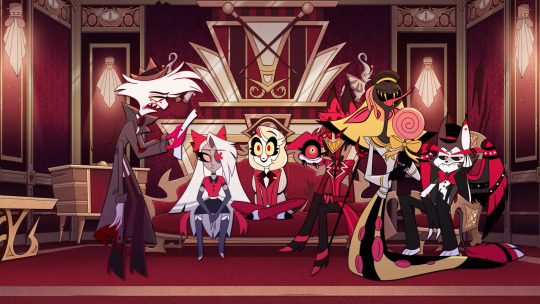
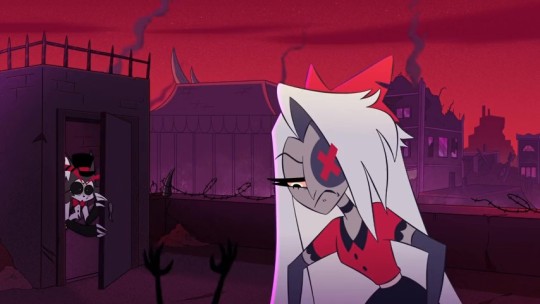
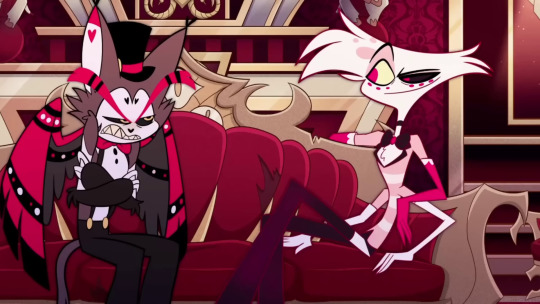
He does his job as a bartender competently, but Husk is fairly blunt about the fact he's only participating in the group's shenanigans because he simply can't be bothered to protest. He does join bonding activities but departs once it's no longer enjoyable for him, after Vaggie decided to literally throw everyone into the middle of a turf war as part of her trust exercises. Thankfully, he grows out of this a bit as the series goes on and grows to care about the staff and guests.
Husk has his own issues and is pretty much apathetic to almost everything out of pessimism. But he still has the most common sense out of the cast and he's the most emotionally intelligent and self-aware, even serving as an advisor to the others at the right times when he's not bitterly accepting his circumstances. The hotel's owner is the only cheerful idealist demon princess who just wants to see the good in everyone, one investor is a maniac who wants to get entertainment out of watching the chaos, the other investor is the owner's neglectful, depressed father (and also the literal King of Hell), the manager is bossy and threatens people with weapons at the slightest provocation, and the cleaning lady is a neatfreak with a thing for "bad boys". Then there's Husk wanting nothing to do with their escapades. He's also a lot more hostile towards Alastor and Angel after they touch him multiple times.

It should be noted that Alastor lets Husk get away with flipping him off. But the moment Husk brings up the fact that Alastor's own soul belongs to someone else within earshot of the Radio Demon, Alastor can barely restrain himself to threatening to tear Husk's soul apart and broadcast his screams for all to hear if he ever says that again. By the end of the encounter, Husk is a shivering, terrified wreck and Alastor couldn't care less.
As the bartender, Husk knows how to listen to people and knows exactly what kind of problems that all the residents of the hotel are going through, and while he would rather let them solve their own problems, he isn't exactly above giving them some pretty solid, if very brutally honest. While it was unnecessarily rude to bring up the Hotel residents' flaws, Husk was accurate about every one of them as Charlie's desperate to help others but doesn't confront her own issues, Vaggie judges others because she hates herself, Sir Pentious is a lonely Sinner who watches people in their sleep, and Angel puts on an act that he's happy about his porn star job but is really miserable.

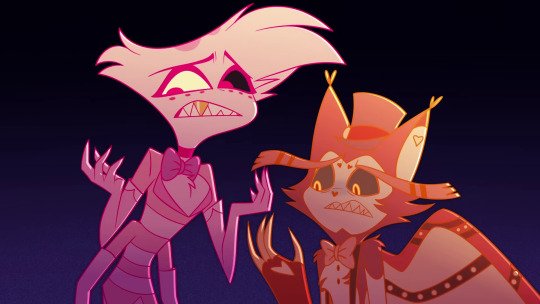
Husk was always cynical and crass, but he's also an old Sinner with a tender heart. With Angel however, he tends to be a lot more irritable. While it initially looks to be because of Angel constantly flirting with him, it's because he hates how hard Angel acts out to hide how miserable he actually is, considering him a "phony" in a self-destructive spiral. He eventually realizes he and Angel are the same, despite their differences. They're both self-destructive addicts since Husk is a gambling addict, while Angel is addicted to sex and drugs who sold their souls to an abusive Overlord. And both of them have descended even further into their addiction and adopted outwardly cynical, cruel personas as a coping mechanism.
Husk getting through to Angel Dust in the manner he does makes a considerable amount of sense when it's taken into account that the first step to overcoming drug addiction is usually getting the addict to acknowledge they even have a problem. Angel hasn't been able to get better despite having some genuine interest because he's been utterly refusing to admit he has a problem to fix, the moment he does his mood drastically improves as does his motivation.
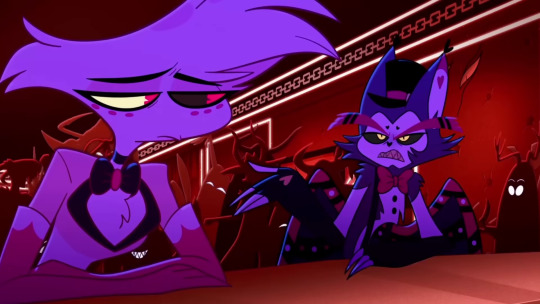
In "Welcome To Heaven", Husk saw Cherri as a bad influence on Angel's path of redemption and advised her not to get high during their night out. He even defends Angel from Cherri's criticism about how the hotel was changing him. Of course Husk wants what's best for Angel, but unlike Cherri who thinks that feeding into Angel's addictive tendencies are the best way to treat his depression and that living up to the hotel's standards is only making his life more difficult, Husk encourages Angel to stick with the self-improvement he's learned from the hotel and not fall back into his old ways since Angel's trying to get into Heaven.
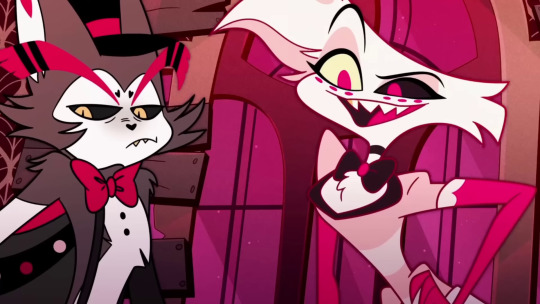
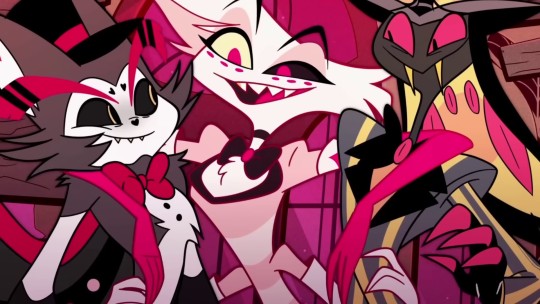
When Vaggie leaves to find out how angels can be killed, she tells Angel, Sir Pentious, Husk and Niffty that she knows they didn't sign up to be the first targets of the angels, so she wouldn't blame them if they left. Of course, when she and Charlie return, they find that all of them have stayed and fortified the hotel.
Husk even admitted that he doesn't want to look for new drinking buddies and being nice to both Angel and Pentious is a demonstration of the massive character development he's undergone over the course of the show. In the beginning, he was grouchy towards everyone and hated even being in the hotel, but now he's willing to risk his life to defend it and the other residents.
#hazbin hotel#vivziepop#hazbin analysis#character analysis#huskerdust#hazbin hotel angel#angel dust hazbin hotel#angel dust and husk#hazbin angel dust#husk#husk hazbin hotel#hazbin husk#hazbin hotel husk#husker#alastor the radio demon#radiohusk#huskdust#angelhusk#character writing#cherri bomb#cherri hazbin hotel#hazbin hotel charlie#hazbin alastor#alastor and husk#hazbin hotel niffty#niffty
343 notes
·
View notes
Text
You know, when I see fictional characters who repress all their emotions, they're usually aloof and very blunt about keeping people at a distance, sometimes to an edgy degree—but what I don't see nearly enough are the emotionally repressed characters who are just…mellow.
Think about it. In real life, the person that's bottling up all their emotions is not the one that's brooding in the corner and snaps at you for trying to befriend them. More often than not, it's that friendly person in your circle who makes easy conversation with you, laughs with you, and listens and gives advice whenever you're upset. But you never see them upset, in fact they seem to have endless patience for you and everything around them—and so you call them their friend, you trust them. And only after months of telling them all your secrets do you realize…
…they've never actually told you anything about themselves.
#i just see it explored so rarely and i think there's a whole bunch of untapped potential here#or else i've been reading the wrong books i dunno#writeblr#writing#character writing#tropes#c: clara hightower#c: elise jamieson#I'm just sayin'#time for ruby's opinion
147K notes
·
View notes
Text
character writing tips
if y’all don’t agree w some of the stuff on this then pls. Be respectful and scroll
ok let’s go! 😭😭
give a character likeable traits but also give them flaws
if the character is meant to be a protagonist then give them more likeable traits than flaws
if they’re an antagonist then give them more flaws than likeable traits
note that that’s not really necessary. And you CAN make ur antagonists nicer and cooler than ur protags but tbh ion think anyone would read that story 😭😭😭
UNLESS the characters change over time 😃 (+ points for character development yay!!!)
Speaking of character development…. Make there be sum. Ion care if there are fifteen plot holes in the fanfic im reading but if Y/N is STILL self destructive by the end of the 70th chapter then blud what was I even reading for (I do actually care about the plot holes but whatever that’s for another day)
p.s., character development is not always the IMPROVEMENT of a characters personality… maybe Ellie grew into a vindictive revenge seeker after the villain murdered her entire family idk who knows
give them strengths and weaknesses
are they super strong? Well maybe they’re super slow too. Are they really smart? Well maybe they’re really physically weak. Balance it out peoples
plsplsplspls don’t make them cringe “u don’t wanna see my dark side 👿👿” sis no
don’t make them hypocrites… the biggest example of this is prolly Zade Meadows when he has sum big ass organisation who saves girls from getting trafficked and rape but then LITERALLY RAPES ADELINE MULTIPLE TIMES … like dude no that’s not kewl ! 😐
“Alastor Evan Thorne” is an acceptable name but “Violet Misty Ebonia Raven Syringe Cornelia von Darke” is not and for the love of god please don’t say that this needs further explanation
this was kinda shit but some of it was useful so yah I guess have fun guys
#Writing#writing tips#creative writing#writers on tumblr#writerscommunity#writing advice#tips#character writing#original character#how to write a book#writeblr#writer stuff#character building#writing characters#HEAVENLYRAIN’S WRITING TIPS
230 notes
·
View notes
Note
Are there proper ways to write characters spiraling into violent madness without going full Hollywood stereotype?
Thanks for asking! Here are some tips:
Research Mental Health: Before writing about madness, research various mental health conditions and how they manifest. Understanding the nuances of conditions such as schizophrenia, bipolar disorder, or psychosis can help you portray the descent into madness more realistically.
Show the Descent: Instead of suddenly plunging your character into madness, show a gradual decline. Start with subtle changes in behavior or thoughts that become increasingly erratic over time. This gradual progression will make the transformation feel more believable.
Internal Conflict: Explore the internal struggles of your character as they grapple with their deteriorating mental state. Show the conflict between their rational mind and the irrational thoughts or impulses taking over. This can create empathy for the character and make their descent more compelling.
Symbolism: Use symbolism and metaphor to convey the character's mental state without being too literal. Show their inner turmoil through imagery, dreams, or hallucinations that reflect their psychological struggles.
Character Complexity: Avoid portraying the character solely as a "madman" or "madwoman." Instead, develop them as complex individuals with hopes, fears, and motivations beyond their descent into madness—or that consume them and drive their descent. This will make them more relatable and humanise their struggle.
External Triggers: Explore the external factors contributing to the character's descent into madness, such as trauma, stress, or societal pressures. These triggers can help contextualise their behavior and add depth to their storyline.
Point of View: Consider using multiple points of view to provide insight into how other characters perceive the protagonist's descent into madness. This can add layers to the narrative and highlight the impact of their actions on those around them.
Avoid Clichés: Steer clear of clichéd tropes commonly associated with madness, such as talking to imaginary voices or engaging in random acts of violence for no apparent reason. Though these are symptoms for some, it can be helpful to focus on depicting the unique experiences and challenges faced by your character.
Humanise the Consequences: Show the real-life consequences of the character's actions, both for themselves and those around them. This can include the emotional toll on loved ones, legal repercussions, or the character's own feelings of guilt and remorse.
Subjective Narrative: If you're writing from the first person perspective, immerse the reader in the character's deteriorating mental state by crafting a subjective narrative that reflects their inner turmoil and warped perspective. Use vivid, sensory language to describe their experiences, conveying a sense of dazed confusion, spiraling thoughts, and disorientation. Make use of fragmented thoughts, disjointed imagery, and stream-of-consciousness techniques to create a narrative that feels almost like a fever dream, drawing readers into the character's unraveling psyche. By making the reader feel as if they are experiencing the madness firsthand, you can create a more immersive and impactful portrayal of the character's descent.
Hope this helped! Happy writing 🎔
#ask#writeblr#writing#writing tips#writing advice#writing help#writing resources#creative writing#character writing
192 notes
·
View notes
Text
Absolutely in love with the idea of movie shadow , and movie sonic mirroring each other in almost every way, instead of contrasting the other. Shadow being the most extreme version of Sonic, someone who once had the same dreams and beliefs, but lost everything, and lost the ability to keep his hopes and dreams alive. Sonic being the most light version of shadow, someone who kept his dreams and hopes alive , despite the loses, he still has everything. I hope in Sonic 3, Sonic and shadow have to fight the crushing weight knowing the they could’ve been each other.
#I’m a BIG fan of that dynamic#the antagonist mirroring the protagonist#i think THAT would fit scu shadow and sonic#they probably end up working together at some point which would make this even better if it happens#sonic the hedgehog#shadow the hedgehog#sonic 3#sonic movie#sonic movie 3#sonic#sonic tag#sth#glitching words#sonic movie 2#sonic scu#scu#sonic fandom#sonic and shadow#sonic and shadow dynamic#character dynamics#character and villain dynamic#the dynamic we love#character writing#writting things#sonadow#sonic movies
211 notes
·
View notes